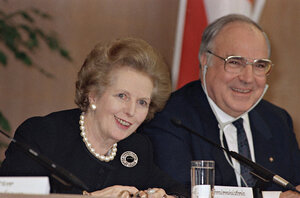British Euroskeptics claim Thatcher, but was she in their camp?
Though held up today by British Euroskeptics as an icon, the late prime minister left a legacy in Europe that is not as one-sided as it might at first appear.

British Prime Minister Margaret Thatcher and West German Chancellor Helmut Kohl during a press conference in the Frankfurt City Hall in Frankfurt in Feb. 1989. Though an icon of modern Euroskeptics, Mrs. Thatcher's relationship with Europe was more complex and contradictory than she is now portrayed.
Kurt Strumpf/AP/File
Dublin, Ireland
Today, the late British Prime Minister Margaret Thatcher is an icon of the euroskeptic right, whose antipathy to everything European has emboldened not only generations of Conservative Party lawmakers, but also the United Kingdom Independence Party now nipping at its heels.
Indeed, one of the moments that most contributed to her not undeserved reputation for recalcitrance centered upon the expansion of Europe's powers. Addressing then European Commission President Jacques Delors' desire to make the European Parliament into Europe's primary democratic institution, with the Commission as the executive and the Council of Ministers as senate, she famously declared "No, no, no!"
But despite being viewed as an anti-European firebrand, Mrs. Thatcher's European legacy, marked by contradiction and compromise, is not as simple and one-sided as it might at first appear.
A shaper of modern Europe
Neither Thatcher's belligerent style nor her deeply-held feelings of British nationalism or desire for Anglo-American harmony meant she refused to deal with the EU. In 1987, for instance, she signed the Single European Act and in 1990 agreed, albeit reluctantly, to join the Exchange Rate Mechanism that eventually led to the creation of the euro currency.
Stephen Booth, research director at Open Europe, a think thank based in Brussels and London that advocates a non-federal EU of nation states, says Thatcher's vision for the EU was much closer to that proposed by his organization than many now realize.
"She became more euroskeptic as she left office. Things like the single [European] market were very much in line with her vision," he says.
Thatcher's ambivalence toward Europe caused a deep split in her party that so damaged the government of her successor, John Major, that many believe it contributed to keeping the Conservatives out of power for a generation. In the face of an EU in economic crisis and the single European currency on the ropes, some now argue she was ahead of her time.
"Her contribution was to liberalize Europe," says Booth. "In a way, she exported her ideas to Europe. [Current British PM] David Cameron is, like Conservative Prime Ministers before him, trying to renegotiate Europe around the nation state."
And praise for her ideas is now coming from an unexpected direction: the European press. Most of the continental European center-right has long been pro-EU, but a new skepticism is in the air.
Italian newspaper Libero says Thatcher's passing leaves Italy alone in a "Merkel-euro nightmare," denouncing European federalism as a faith-based project. Estonia's Postimees hails her anti-communism and support for free-market policies. Germany's Die Welt worries, however, that her euroskepticism may yet split her party in two.
Defense of the nation state
Joseph Cohen, a philosopher who teaches on issues around sovereignty at University College Dublin, says Thatcher's greatest legacy in Europe was to defend the traditions of European nation states.
"Her legacy is to mark the impossibility of a Europe in which there is an EU citizenship over and above national citizenship. In this sense she was extremely clear-sighted. There cannot be a United States of Europe precisely because of the very deep and singular history of each nation, and therefore the history of these relationships is the history of Europe."
She was not entirely correct, however, says Dr. Cohen.
"Where she was not foresighted was that, for worse or for better, what drives frontiers today is not so much these traditions, but economics."
And her nationalism was out of step with European thinking at the time, and may have contributed to her resistance to a result of the most significant Europe-wide event of her premiership: the collapse of the Eastern Bloc of Soviet satellite states, in particular the 1989 breaching of the Berlin Wall.
An ardent anti-communist, she joyously celebrated the end of what her close political ally US President Ronald Reagan called "the Evil Empire," and is credited by conservatives with playing a role in communism's decline.
But Thatcher objected to German reunification. Germany's then-Chancellor Helmut Kohl was "capable of anything," she said, according to a French diplomatic cable revealed several years ago. Her fear may not have been grounded solely in "Little Englandism," so much as fear of the economic might of industrial Germany.
(Mr. Kohl, speaking to Reuters, Monday remained magnanimous, saying of his late rival: "You could only speak of her with great respect, even if on some things you were of a different opinion on one point or another.")
And her nationalism appeared to contain an element of colonialism, says the Paris-born Cohen, who says his first memory of Thatcher was Britain waging war against Argentina.
"We were growing-up in the feverish build-up to '92 [the year the EU's Maastricht Treaty was signed]. We were all going to be the same, use the same money, no borders, and we didn't understand how it was possible for a European to defend a form of colonialism."

